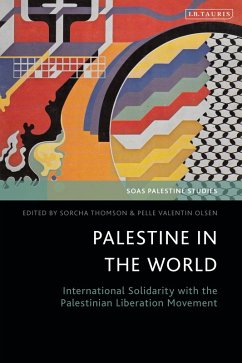The Palestinian national liberation movement - or the Palestinian revolution as it is known in Arabic - emerged during the 1960s as an iconic cause of the global Left. This volume highlights the different practices of international solidarity that characterised this period, and how they shaped and were shaped by the global trajectory of the Palestinian movement.
Bringing together scholars with versatile linguistic and interdisciplinary skills, Palestine in the World puts the Palestinian movement into conversation with the models of transnational politics that emerged through the revolutionary period. From participation in a vibrant sphere of intellectual and cultural production, the work of travelling revolutionaries as delegates, volunteers, and militants, and the connected mobilisations that took place in different corners of the world, international solidarity with and from the Palestinian movement was integral to its ascendance on the global stage. By treating the Palestinian revolution as a world phenomenon - with cases from Cuba, France, the US, the GDR, Japan and more - this volume reveals the forms of solidarity that shaped the rise of the movement and their afterlives today. It illuminates the rich connected histories of international solidarity that positioned the Palestinian movement as an iconic anticolonial struggle.
Bringing together scholars with versatile linguistic and interdisciplinary skills, Palestine in the World puts the Palestinian movement into conversation with the models of transnational politics that emerged through the revolutionary period. From participation in a vibrant sphere of intellectual and cultural production, the work of travelling revolutionaries as delegates, volunteers, and militants, and the connected mobilisations that took place in different corners of the world, international solidarity with and from the Palestinian movement was integral to its ascendance on the global stage. By treating the Palestinian revolution as a world phenomenon - with cases from Cuba, France, the US, the GDR, Japan and more - this volume reveals the forms of solidarity that shaped the rise of the movement and their afterlives today. It illuminates the rich connected histories of international solidarity that positioned the Palestinian movement as an iconic anticolonial struggle.









